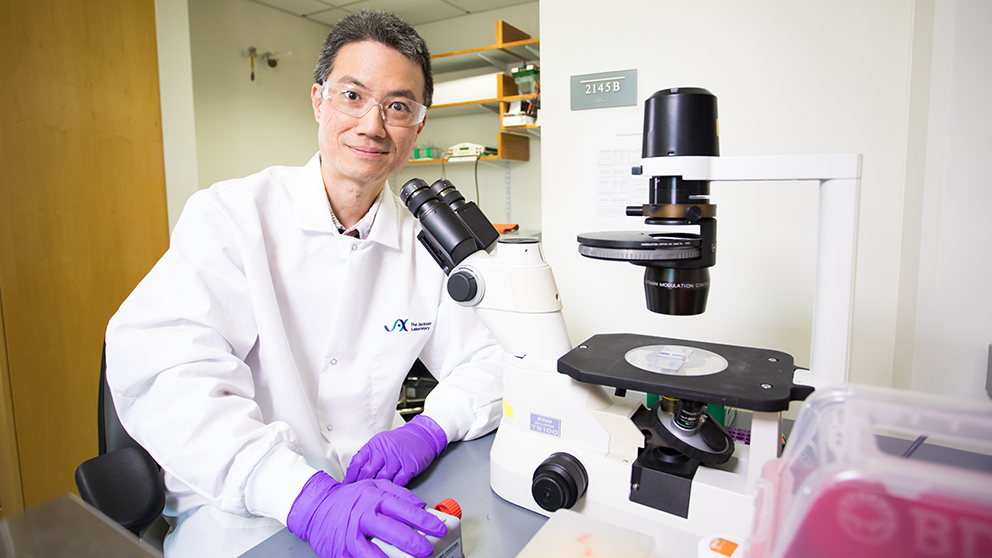Chih-Hao “Lucas” Chang, Ph.D., investigates how the immune system and metabolism interact in both healthy and diseased states. His efforts have led him to a prospective treatment option for the autoimmune disease systemic lupus erythematosus (SLE or lupus).
Rooted in science
From an early age, Chih-Hao “Lucas” Chang, Ph.D., aspired to contribute to the biomedical field. Starting his career in the field of agronomy (the study of soil and crop science aimed at agricultural productivity and sustainability), his path took him through various domains — including chemistry, nutrition science, microorganisms, and pharmacology — before his true calling emerged with a focused exploration of HIV pathogenesis. Throughout his journey, Chang cultivated his experiences across diverse scientific fields, which ultimately led to his profound discoveries in immunology.
Chang investigates the interplay between the immune system and metabolism. His research uncovers how these interactions can affect an individual’s health. The Chang lab specifically digs into how glycolysis (the process of breaking down a type of sugar called glucose to produce energy) affects the mechanics of T cells (white blood cells that protect from disease, illness, and infection). He has discovered that glycolysis influences those cytokines (proteins secreted by certain immune cells to control and activate immune reactions) produced by T cells — a process that’s been linked to the beneficial effects that immunotherapies can induce in cancer patients. “My research bridges the realms of immunology and metabolism, advancing the burgeoning field of immunometabolism,” says Chang.
Cultivating the crossover between cancer and autoimmune disease
One significant focus of Chang’s research has been to explore the overlap between cancer and autoimmune disease. Both involve a delicate immune system balancing act. One approach in cancer treatment involves supporting immune cells capable of fighting cancer by activating them through immunotherapies, while also targeting the hijacked immune cells that cancer uses to shield itself from destruction. In contrast, treatment plans for patients with autoimmune disease tend to focus on reducing immune cell responses.
“For cancer, clinicians try to boost immune cells to fight the disease,” says Chang. “But for autoimmune disease, it is necessary to do the opposite. Current therapies broadly suppress the immune system to control autoimmune activity, which leaves patients vulnerable to infection and cancer. Therefore, we are looking at the contrast between lupus-related cells and ‘normal’ immune cells to create novel therapies that target only the problematic immune cells. Such a treatment would greatly increase the quality of life of patients living with autoimmune disease.”
Breaking new ground for lupus patients
Chang believes insights from what we know about cancer research can be applied to systemic lupus erythematosus (SLE or lupus) — a devastating autoimmune disease affecting ~1.5 million Americans and ~5 million people globally. Lupus occurs when the immune system begins to attack the body’s own tissue. The disease can cause painful inflammation and damage to the skin, joints, kidney, heart, and other internal organs. These symptoms vary greatly between individuals, ranging from mild to severe. Women, especially women of color, have been shown to be at higher risk for this disease. Some notable high-profile individuals, such as Selena Gomez and Toni Braxton, have suffered with lupus for years and have been vocal about the need for better treatment options.
Despite the disease being known for decades and receiving mass media attention, very little is currently understood about its root cause. This poses numerous societal issues that have been recognized by the Department of Defense (DoD). With more women enlisting, the DoD is seeking a way to help treat their affected members who may be living in isolated areas with no access to care. With support from the DoD, Chang has partnered with Greg Carter, Ph.D., a fellow JAX faculty member, and Rung-chi Li, M.D., the section head of Allergy and Clinical Immunology at Northern Light Eastern Maine Medical Center (Bangor, Maine). Together, they are studying whether the severity of lupus is connected to how the body processes glucose, along with how the immune cells utilize glucose after it’s broken down.
Reaping rewards
Empowered by this additional support and collaboration, Chang intends to intensify his efforts to identify specific subsets of B cells (white blood cells that produces infection-fighting proteins called antibodies). This investigation will further advance his discoveries in unraveling the pronounced sensitivity of activated B cells in lupus when they are exposed to glycolysis inhibition, as highlighted in his recent publication in iScience. Initial findings have shown that inhibiting glucose metabolism in lupus-causing cells results in a reversal of the lupus-like symptoms and even extended life span in lupus-prone mice. These results have fueled Chang’s determination to delve deeper into understanding metabolic dysfunction during lupus progression and to explore the possibility of crafting novel compounds that specifically target autoimmune disease. He believes that revealing the biological mechanisms behind lupus will unearth more precise therapeutic interventions, and he is optimistic about the prospects for repurposing existing cancer-fighting drugs to treat lupus.
“We are going to zoom in on the active B cells in lupus patients and particularly focus on those B cells that rely heavily on glycolysis,” says Chang. “This foundation will help us get a clearer picture of which types of cells are in play and how they differ at a metabolic and molecular level.”
Driven by the desire to discover more effective treatments, Chang is excited to have ongoing support from The Jackson Laboratory and its affiliates. The future blooms with potential for advancements in treating autoimmune diseases that have long been under-researched and underfunded.
